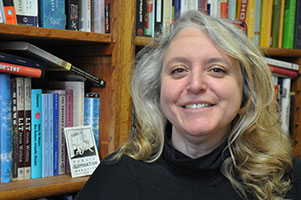A Friendship Across the Divide
In Sarah Einstein’s Mot: A Memoir, a woman in search of herself befriends a tormented wanderer
Of all the cultural barriers that segment American society, there’s none higher or more solid than the one separating the chronically homeless from the rest of us. More fortunate folk treat and speak of homeless people, especially those who are mentally ill, as a caste apart, openly regarding them with a mixture of pity, disdain, and fear. Genuine friendships across this divide are, sadly, pretty rare. Sarah Einstein’s Mot: A Memoir tells the story of just such a friendship—one that doesn’t so much erase the divide as make the best of it, finding opportunities for generosity and tenderness in the struggle to connect.
 Einstein is managing The Friendship Room, a drop-in center for the homeless in Morgantown, West Virginia, when she first encounters Mot, a man in his sixties who “wanders from place to place dragging a coterie of dead relatives, celebrities, Polish folk-tale villains, and Old Testament gods along with him in his head.” Ironically, Einstein is the one most in need of a friend at the time.
Einstein is managing The Friendship Room, a drop-in center for the homeless in Morgantown, West Virginia, when she first encounters Mot, a man in his sixties who “wanders from place to place dragging a coterie of dead relatives, celebrities, Polish folk-tale villains, and Old Testament gods along with him in his head.” Ironically, Einstein is the one most in need of a friend at the time.
Despite considerable previous experience in working with the homeless, she has failed miserably in her job. Some of the center’s regular clients—many of them addicted to meth or crack—have made her the focus of their anger and resentment, and a particularly ugly assault has finally convinced her to resign. As she begins slogging through her final weeks at The Friendship Room, Mot arrives and takes a shine to her, entertaining her with tales of his travels and providing a sort of buffer against the hostile cohort outside her office.
Einstein’s troubles aren’t confined to her work life. Her marriage to Scotti, a psychologist, is also floundering. They haven’t been married very long, and though the two of them share humanitarian ideals, Scotti is hypercritical and controlling in a way that Einstein finds increasingly intolerable. When Mot leaves Morgantown for Amarillo, Texas, Einstein impulsively drives there to be with him for a week—partly out of concern for him but mostly for a little respite from her unhappy situation. Mot’s rootless existence and his strange combination of shrewdness and vulnerability fascinate her. When she’s with him, she feels “aimless and free.”
The friendship is often tender and has a certain childlike joy, but it’s not exactly untroubled. Mot, who long ago left behind his original identity as Tom, is sweet, intelligent, and capable in his lucid moments, but when his delusions kick in, he becomes unpredictable. He’s constantly tormented by “the Big Guys Upstairs,” a chorus of cruel voices with names like Moloch and Kaiser Bill. The voices play tricks on him, force him to lose track of time, and sometimes make it impossible for him to eat. And they don’t want him to have any friends.
 Einstein is especially distasteful to Them because she’s Jewish, and anti-Semitism is one of the voices’ obsessions. Mot’s warning plays again and again in the back of Einstein’s mind—There are a lot of bad characters over here, and most of them don’t want you around. Though Mot never directly threatens or harms her, a hint of danger is always present when the two of them are together.
Einstein is especially distasteful to Them because she’s Jewish, and anti-Semitism is one of the voices’ obsessions. Mot’s warning plays again and again in the back of Einstein’s mind—There are a lot of bad characters over here, and most of them don’t want you around. Though Mot never directly threatens or harms her, a hint of danger is always present when the two of them are together.
One of the remarkable things about Mot is the way it manages to convey a vivid sense of what it’s like to navigate a close relationship with a delusional person. Einstein has to strategize constantly to avoid saying or doing anything that might set off the voices or remind Mot of his childhood traumas, which were extensive and horrifying. Just as she can’t quite trust him, Mot can’t fully trust her not to inadvertently hurt him or put him suddenly at the mercy of the demons within. The miracle is that they’re able to connect in spite of this mutual unease. They talk, watch films, share meals, and explore their surroundings, taking pleasure and solace in each other’s company as dear friends do. Having to tiptoe around the Big Guys Upstairs seems, if anything, to make their bond more intense.
With Einstein’s help, Mot eventually returns to Morgantown and attempts to construct a settled existence. Einstein, meanwhile, tries to manage her own life, and neither of them finds the going easy. Mot is not a story of pat answers or happy endings. It is, ultimately, a passionate and moving argument for looking beyond the assumptions that blind us to the humanity of the Mots of this world. As Einstein portrays him, Mot is a tortured soul, not a diminished one. He would like to be a part of life on Einstein’s side of the divide, but that is not within his power. “I think I would love you if They let me feel love,” he tells her. “This is probably the closest I’ll get.”

Maria Browning is a fifth-generation Tennessean who grew up in Erin and Nashville. A graduate of Mount Holyoke College, she has attended the Clothesline School of Writing in Chicago, the Moss Workshop with Richard Bausch at the University of Memphis, and the Sewanee Writers’ Conference. She lives in White Bluff.


